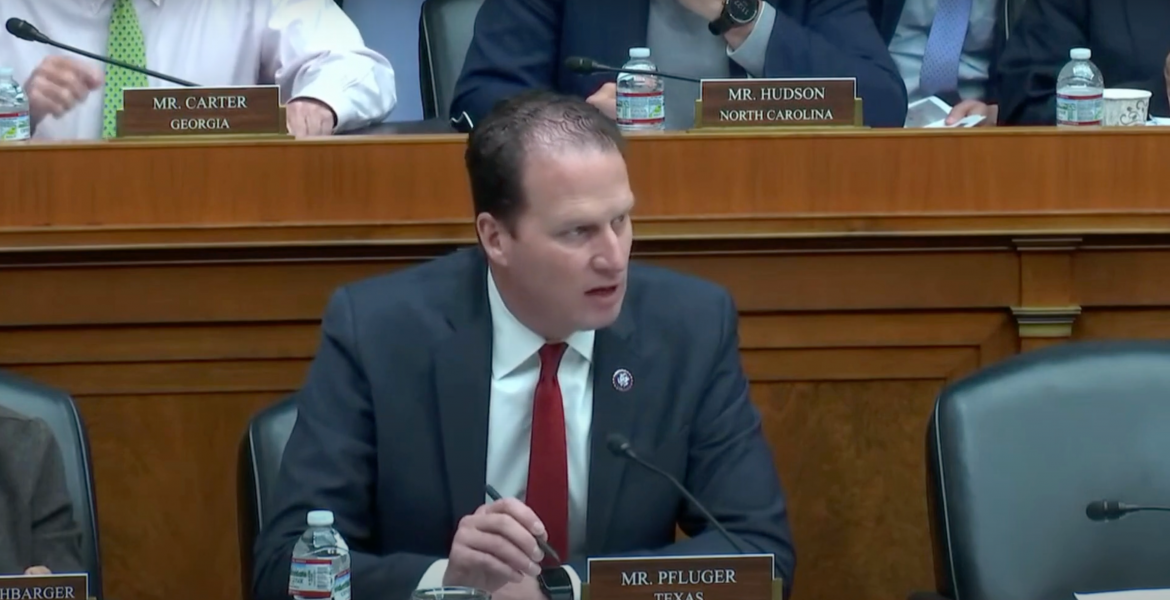WASHINGTON, DC — Congressman August Pfluger’s (TX-11) bipartisan, bicameral legislation seeking to lower military aviation cancer rates passed through the U.S. House of Representatives by a vote of 376-5.
The Aviator Cancer Examination Study (ACES) Act directs the Secretary of the VA to study cancer incidences and mortality rates among aviators and aircrews who served in the Navy, Air Force, and Marine Corps.
The ACES Act was co-led in the House by Congressman and U.S. Navy veteran Jimmy Panetta (CA-19) and in the Senate by Senator Mark Kelly (D-AZ) and Senator Tom Cotton (R-AK), both veterans and members of the Senate Armed Services Committee.
To celebrate its passage on the House floor today, Rep. Pfluger, Rep. Panetta, Senator Kelly, and Senator Cotton released the following statements:
“As a former fighter pilot, I know firsthand the risks that airmen and women take every day when they step into the cockpit, and I've fought alongside the best this nation has to offer," said Rep. Pfluger. "But I have also stood in hospital rooms watching far too many of my brothers and sisters fight their toughest battles not in the air, but in the hospital room against cancer. The ACES Act is not just a bill—it's a lifeline for those who have already given so much for our freedom, and it's a message to every pilot who's ever put on a uniform to protect our skies that we will fight to protect them in return. The ACES Act has been my top priority in Congress since I was elected, and I am thrilled that after years of advocacy, this legislation has finally passed through the House, and I urge its swift passage in the Senate."
“Many veterans face serious health risks, including increased rates of cancer potentially linked to aviation service,” said Rep. Panetta. “The House’s passage of the ACES Act is an important step forward in our efforts to uncover the full scope of these diagnoses and ensure our military and VA providers have the data they need to respond. The Senate must act, and do so quickly, to provide our aviators and, ultimately, all of our veterans, with the care and answers they deserve.”
“As a former Navy pilot, there are certain risks that we know and accept come with our service, but we know far less about the health risks that are affecting many aviators years later,” said Senator Kelly. “Veteran aviators deserve answers about the correlation between their job and cancer risks so we can reduce those risks for future pilots. I’m proud to lead this effort in the Senate and won’t rest until we get it across the finish line.”
“We owe it to past, present, and future aviators in the armed forces to study the prevalence of cancer among this group of veterans," said Senator Cotton. "I applaud the House for passing this important piece of legislation and look forward to leading the effort, along with Senator Kelly, to pass it through the Senate."
Before its passage, Rep. Pfluger spoke on the House floor in support of this legislation, and his remarks can be viewed HERE. Read the full text of the legislation HERE.
The passage of Rep. Pfluger's legislation was also celebrated by several veteran organizations and advocacy groups, including Red River Valley Association (RRVA), With Honor Action, HunterSeven Foundation, the MACH Coalition, Fleet Reserve Association, the Wounded Warrior Project, and Veteran Prostate Cancer Awareness Inc.
Vince Alcazar, COL, USAF, ret., MACH Coalition Founder & Director said, “The Military Aviator Coalition for Health (MACH) celebrates the passage of H.R. 530, the Aviator Cancer Examination Study (ACES) Act. With three major Department of Defense studies in the last four confirming and quantifying significantly elevated cancer rates among U.S. military flyers, the ACES Act goes the next step. This bill would ask the National Academy of Sciences, Engineering, and Medicine to apply their extensive Veteran health study capacity to determine what in the operating environments of military aviation is likely causing cancer. This study is essential. Without the ACES Act, military medicine will have no practical way of mitigating risk, and Veteran flyers will have no basis to correlate their service to potential cancer. This day was five years in the making. We recognize and praise the leadership of Congressman August Pfluger in leading this bill through three Congresses to today. Congressman Pfluger is an amazing champion of this work.”
Theo Lawson, Assistant Director, Legislative Programs, Fleet Reserve Association, said, "The Fleet Reserve Association (FRA) wholeheartedly celebrates the passage of the ACES Act in the House and extends our sincere congratulations to Congressman August Pfluger, his staff, and the bill's cosponsors for their incredible dedication in advancing this vital legislation. Understanding cancer is the first step to defeating it, and this bill brings us closer to uncovering the critical links between aircrew service and cancer risks. Their leadership ensures our sea service aviators and all aircrew members are better equipped to identify and combat this silent enemy. We look forward to continuing the fight alongside them until the ACES Act becomes law–honoring the sacrifices of our servicemembers and safeguarding future generations."
Mario Marquez, Executive Director of Government Affairs, said, “On behalf of the 1.5 million veterans nationwide, The American Legion proudly supports the ACES Act. Research is critical to our understanding of the impacts of toxic exposures, from Agent Orange to harmful chemicals on aircraft. We applaud Representative Pfluger for prioritizing this critical issue and thank the House of Representatives for passing the ACES Act with resounding support. The American Legion urges the Senate to vote on this bill and continue to invest in research surrounding the impacts of toxic exposures.”
Background
Pilots and aircrews have been found to have a higher risk of developing prostate cancer and melanoma, with possible links to non-Hodgkin lymphoma and testicular cancer.
This legislation is "critical" as it would improve our understanding of the link between military service and cancer risks among Veteran aviators. "By better understanding the correlation between aviator service and cancer, we can better assist our military and provide more adequate care for our veterans," information from Pfluger's office states.
In March, Rep. Pfluger participated in the House Committee on Veterans' Affairs Subcommittee on Disability Assistance and Memorial Affairs legislative hearing on several bills, including Rep. Pfluger's Aviators Cancer Examination Study (ACES) Act. Additionally, Rep. Pfluger's good friend and fellow fighter pilot, who is actively battling cancer as a result of his service, Colonel Andy "Pablo" Shurtleff, appeared as a witness to the committee to share his story and explain the need and urgency for the ACES Act.
The ACES Act will help advance research on any correlation between aviator service and cancer rates to better assist veterans and active service members. The ACES Act was introduced in the 117th and 118th Congresses.
Subscribe to the LIVE! Daily
Required






Post a comment to this article here: